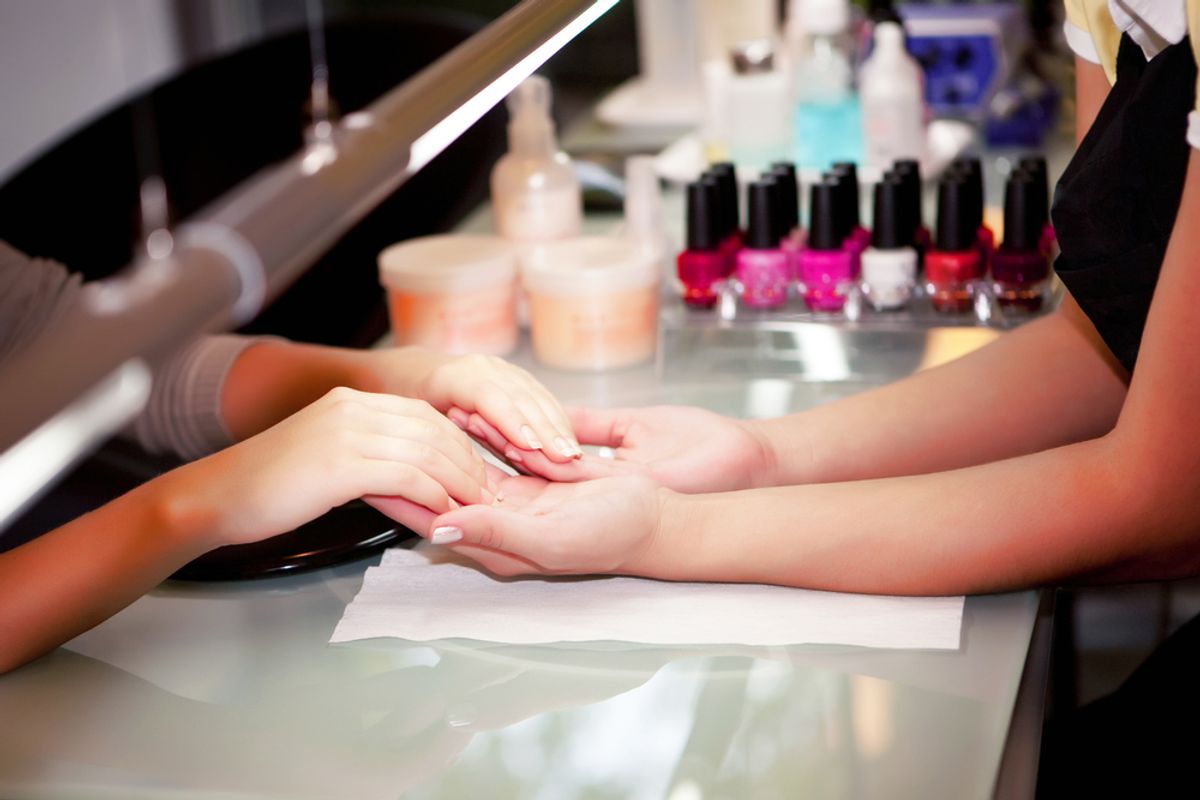On Thursday, the New York Times published an exposé by Sarah Maslin Nir on the mistreatment and horrid conditions of New York City nail salons. Since the 1990s, the popularity and accessibility of manicures have sky-rocketed. Unfortunately, the working conditions for the tens of thousands of manicurists and technicians employed in the city have deteriorated and gone largely unregulated by government authorities.
Here are some of the worst offenses reported:
1. Wages are absurdly low.
And the cheaper the manicure, the more likely it is that the technician's wages are being stolen.
Asian-language newspapers are rife with classified ads listing manicurist jobs paying so little the daily wage can at first glance appear to be a typo. Ads in Chinese in both Sing Tao Daily and World Journal for NYC Nail Spa, a second-story salon on the Upper West Side of Manhattan, advertised a starting wage of $10 a day. The rate was confirmed by several workers...
Among the more than 100 workers interviewed by The Times, only about a quarter said they were paid an amount that was the equivalent of New York State’s minimum hourly wage. All but three workers, however, had wages withheld in other ways that would be considered illegal, such as never getting overtime.
2. Even when owners are found guilty of wage theft, it can often be impossible to recover back wages.
In rare instances when owners have been found guilty of wage theft, salons have often been quickly sold, sometimes to relatives. The original proprietors vanish, along with their assets, according to prosecutors. Even if they do not, collecting back wages is difficult. Owners can claim they do not have the means to pay, and it is often impossible to prove otherwise, given how unreliable salons’ financial records are.
3. An ethnic caste system means that some workers are even more mistreated than others.
80 percent of salons in New York City are Korean-owned, and Korean workers often get first pick of the jobs they want in the city and often earn as much as twice the wages of their peers. Hispanic and other non-Asian workers occupy the lowest rung of the hierarchy and are often subjected to humiliating, torturous policies:
Ana Luisa Camas, 32, an Ecuadorean immigrant, said that at a Korean-owned Connecticut salon where she worked, she and her Hispanic colleagues were made to sit in silence during their entire 12-hour shifts, while the Korean manicurists were free to chat... Lhamo Dolma, 39, a manicurist from Tibet who goes by Jackey, recalled a former job at a Brooklyn salon where she had to eat lunch every day standing in a kitchenette with the shop’s other non-Korean workers, while her Korean counterparts ate at their desks.
4. The "apprenticeship" system means that manicurists are often denied pay for months.
In order to get a job, a manicurist will have to pay their boss anywhere from $100 to $200. They are then unpaid apprentices until their boss decides otherwise.
Ms. Ren spent almost three months painting on pedicures and slathering feet with paraffin wax before one afternoon in the late summer when her boss drew her into a waxing room and told her she would finally be paid...That night her cousins threw her a party. The next payday she learned her day wage would amount to under $3 an hour.
5. To get a raise, manicurists have to pay to earn new skills.
...There are actually two price lists at [Ms. Ren's] salon. One is for customers. The other is jotted down in a hidden-away notebook and lists the prices employees must pay the owner to learn new skills: such as $100 for eyebrow waxing, $100 to learn how to apply gel and cure it with ultraviolet light. A raise would require a new skill — her boss suggested eyebrows and gel — and the cash fee.
Read the complete article here.

Shares